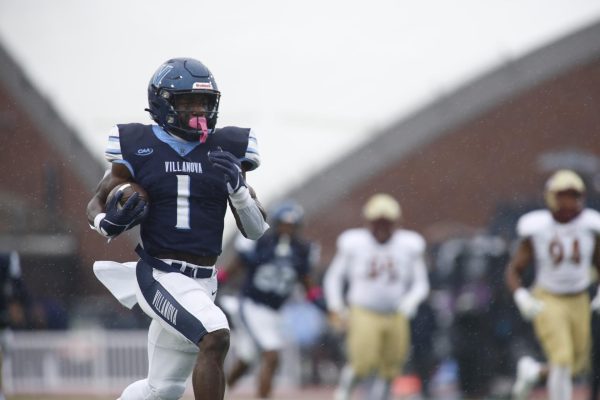Choosing business over loyalty hurts Eagles
March 18, 2009
Of all the clichéd, overused statements that further alienate fans from the games they love, the one that continuously leaves a taste of greed and isolation in their mouths is this: Professional sports is a business.
If professional sports truly is a business, then the Philadelphia Eagles may want to rethink their operating methods. Somewhere within the rigid organizational structure of the Eagles, something is terribly wrong. Their annual report argues differently. Four NFC Championship games in seven years. The winningest quarterback and head coach in franchise history. Lincoln Financial Field has been sold out on game-day for over 80 consecutive Sundays. Sounds like a successful business, doesn’t it?
Head Coach Andy Reid and General Manager Tom Heckert had the unenviable task of letting two loyal employees walk away from the organization this offseason. “It’s nothing personal,” they say. “It’s just business.” If the Eagles want to be treated like a business, then let’s give them what they deserve: a performance review. Let’s start with the employees.
Example 1: Brian Dawkins. Since joining the Eagles in 1996, Dawkins has been the heart and soul of the city’s favorite team. He has been through the battles, seen all the wars and given his all to the franchise. Thirteen years and seven pro bowls later, Dawkins, 35, found himself without a contract this offseason. After being humiliated by the Eagles’ initial offer, B-Dawk chose to sign with the Denver Broncos.
Example 2: Tra Thomas. The three-time pro bowler also saw his contract expire in the offseason. After starting 165 of 166 games at left tackle for the Eagles, Thomas was quick to sign with the Jacksonville Jaguars after the Eagles showed little interest in bringing back the big man.
After protecting quarterback Donovan McNabb’s blindside at left tackle for 12 years, Thomas was blindsided by the Eagles a mere six weeks after season’s end. Upon his arrival in Florida, Thomas had a negative opinion about the Eagles’ management:
“I look at the coach from Pittsburgh,” Thomas said. “[Mike Tomlin] seems like he’s a real passionate coach. He’s really into his players, joking around with them. I think he’s a great motivator, also. Other coaches around the league, I’ve seen them get passionate. Philly is just a little different. It’s more businesslike, you know? Like, ‘I expect you to do it, and that’s it.'”
Example 3: Dan Leone. This former employee of the Eagles worked game-days at Lincoln Financial Field for six faithful seasons. Born and raised in South Philly, Leone was a die-hard Eagles fan. After he witnessed his Eagles show the exit door to Dawkins, he did what any fan across the Delaware Valley would do: he vented. Leone published a two sentence statement on his Facebook account that criticized the Eagles for letting their star safety go. Four days after the message appeared online he was terminated via phone, yet another brilliant business tactic that is both ethical and classy.
Now to that model of business perfection, the Eagles’ upper management. Reid has a track record of success, but is he the leader that will lead Philly to the promised land?
As for communication skills, Reid once decided to not tell his pro bowl quarterback McNabb that he was being benched after halftime of a regular season game. He handles the media with the same humdrum approach that many of his game plans are poisoned with.
Let’s not forget about General Manager Tom Heckert. He, along with Reid, let the aforementioned Eagle greats stroll out of Philadelphia without even a goodbye cheesesteak.
Last but certainly not least, how does this “business” rate in customer service? For starters, the Eagles decided to raise ticket prices by $5 and $10 this offseason. While most NFL franchises held their current ticket prices, the Eagles ignored the economic nightmare currently crippling the country. But money is money. It can purchase tickets and merchandise but not much else. The real crime committed against Eagle fans was theft; theft of a Philadelphia idol. No. 20’s Eagle green is now Bronco orange, a heartbreaking color warp for Eagle fans around the world.
The Eagles can continue thinking that they are running a Fortune 500 company, but they are wrong, unequivocally wrong. Professional sports franchises are not judged by their net gross. Sure, owners would argue differently, but the rest of the world measures success by what happens outside of the board room. Win Super Bowls. Treat fans with respect. Be open to the media.
Sadly enough, we all know that professional sports is a business. But the key is acknowledging that that’s not all it is. It is a culture; it is an art. Its consumers are not buying flat screen televisions or car insurance from them.
They give teams their hard-earned money and hope to leave with nothing more than lasting memories and immense pride for belonging to something bigger than themselves. Fans go to games hoping to get away from the bitter money squabbles that consume them at work, not to rejoin them.
So Eagles, we know that you think professional sports really is a business, but give fans time to shut their eyes and cover their ears before a living Philadelphia legend is ripped away for no reason other than a dollar.
———————-
Justin DiBiase is a senior civil engineering major from Franklinville, N.J. He can be reached at [email protected].










